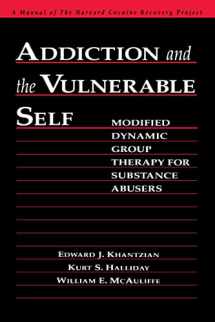
Addiction and the Vulnerable Self: Modified Dynamic Group Therapy for Substance Abusers (The Guilford Substance Abuse Series)
Book details
Summary
Description
The Harvard Cocaine Recovery Project, a National Institute on Drug Abuse-funded randomized clinical trial, was initiated in 1986 to compare different approaches for treating cocaine abusers. Modified Dynamic Group Therapy (MDGT), one of the models used in the study, is a short-term supportive-expressive psychodynamic group approach specifically adapted for cocaine addicts. While many previous studies of substance abuse treatment were compromised by extraordinarily high dropout rates, this approach retained nearly 70% of group members for the entire length of treatment. This book describes MDGT and provides a practical guide to implementation.
Based on an understanding of the psychological vulnerabilities of addicts, the MDGT model addresses the modifications in psychodynamic technique that are necessary for addicts' needs. It focuses on four main areas of difficulty involving self-regulation; affect, self-esteem, relationship, and self-care problems. Both supportive and expressive, the approach helps group members identify, process, and modify the characterological traits that mask addict's vulnerabilities. With this approach, a well-led group can heighten self-esteem, improve self-care, combat feelings of isolation and shame, and strengthen the individual's capacity for positive change. Concomitant involvement with an individual therapist/counselor is encouraged as a means to support and facilitate the group therapy, especially early in group treatment, and to maintain a flexible individual and group treatment context for self-exploration and understanding. Bringing the model to life are detailed vignettes and transcripts of groups in different phases of recovery. These cases demonstrate techniques, illustrate technical issues, and illuminate major themes that unfold during treatment.


We would LOVE it if you could help us and other readers by reviewing the book
Book review




